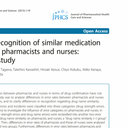Effects of hypothermia and hyperthermia on attentional and spatial learning deficits following neonatal hypoxia-ischemic insult in rats.
키워드
요약
We previously reported that rats exposed to neonatal hypoxic-ischemic (HI) insult showed selective and long-lasting learning and memory impairments in the plus maze, 8-arm radial maze, choice reaction time (CRT) task, and water maze, and that they showed severe brain injury to areas such as parietal cortex, hippocampus, striatum and thalamus. In this study, we examined the effects of hypothermia and hyperthermia on learning and memory deficits following neonatal HI insult. Seven-day-old Wistar rats were subjected to left carotid artery ligation followed by 2 h of hypoxia (8% O2/92% N2) under three different temperature conditions: 27 degrees C (hypothermia), 33 degrees C (normothermia) and 37 degrees C (hyperthermia) in temperature-controlled chambers. Hypothermia significantly reduced attentional deficits in the CRT task and spatial learning deficits in the water maze, and protected against severe brain injury in comparison with the control temperature. On the other hand, hyperthermia aggravated the behavioral deficits and brain injury. These outcomes clearly show that temperature regulation during HI insult plays an important role in the induction of behavioral and histological changes following neonatal HI insult in rats.


